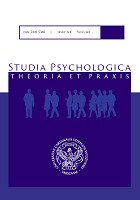A cross-cultural study of purposive “traits of action”: Measurement invariance of scales based on the action–trait theory of human motivation using exploratory structural equation modeling
A cross-cultural study of purposive “traits of action”: Measurement invariance of scales based on the action–trait theory of human motivation using exploratory structural equation modeling
Author(s): Larry C. Bernard, Jan Cieciuch, Andrew Lac, Barbara Žuro, Dino Krupić, Michael Richter, Nicolas Silvestrini, Bettina von HelversenSubject(s): Psychology, Developmental Psychology, Personality Psychology, Methodology and research technology
Published by: Wydawnictwo Naukowe Uniwersytetu Kardynała Stefana Wyszyńskiego w Warszawie
Keywords: AIM-Q; motivation; motive; evolutionary psychology; personality;
Summary/Abstract: The Action–Trait theory of human motivation posits that individual differences in predispositional traits of action may account for variance in contemporary purposeful human behavior. Prior research has supported the theory, psychometric properties of scales designed to assess the motive dimensions of the theory, and the utility of these scales to predict an array of behaviors, but this is the first study to evaluate the cross-linguistical invariance of the 15-factor theoretical model. This study evaluated translations of the English language 60-item Quick AIM in 5 samples – Croatian (N = 614), French (N = 246), German (N = 154), Polish (M = 314), and U.S. English (N = 490) – recruited from 4 countries (Croatia, Poland, Switzerland, and the U.S.). Exploratory structural equation modeling (ESEM) supported the theoretical model on which the traits of action are based and scrutinized the measurement invariance (configural, metric, scalar invariance) of the scale across the languages.
Journal: Studia Psychologica: Theoria et praxis.
- Issue Year: 21/2021
- Issue No: 1
- Page Range: 5-29
- Page Count: 25
- Language: English

